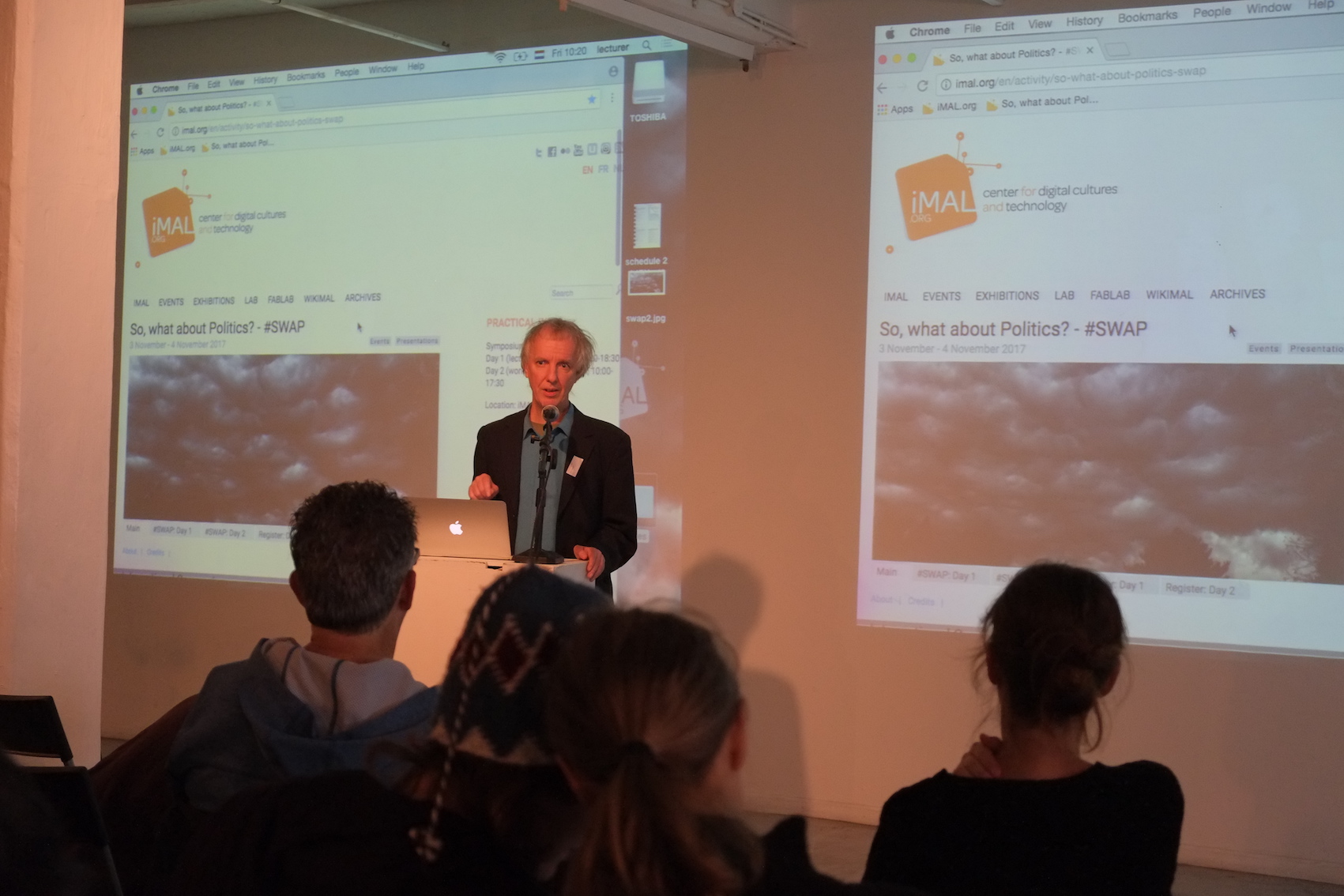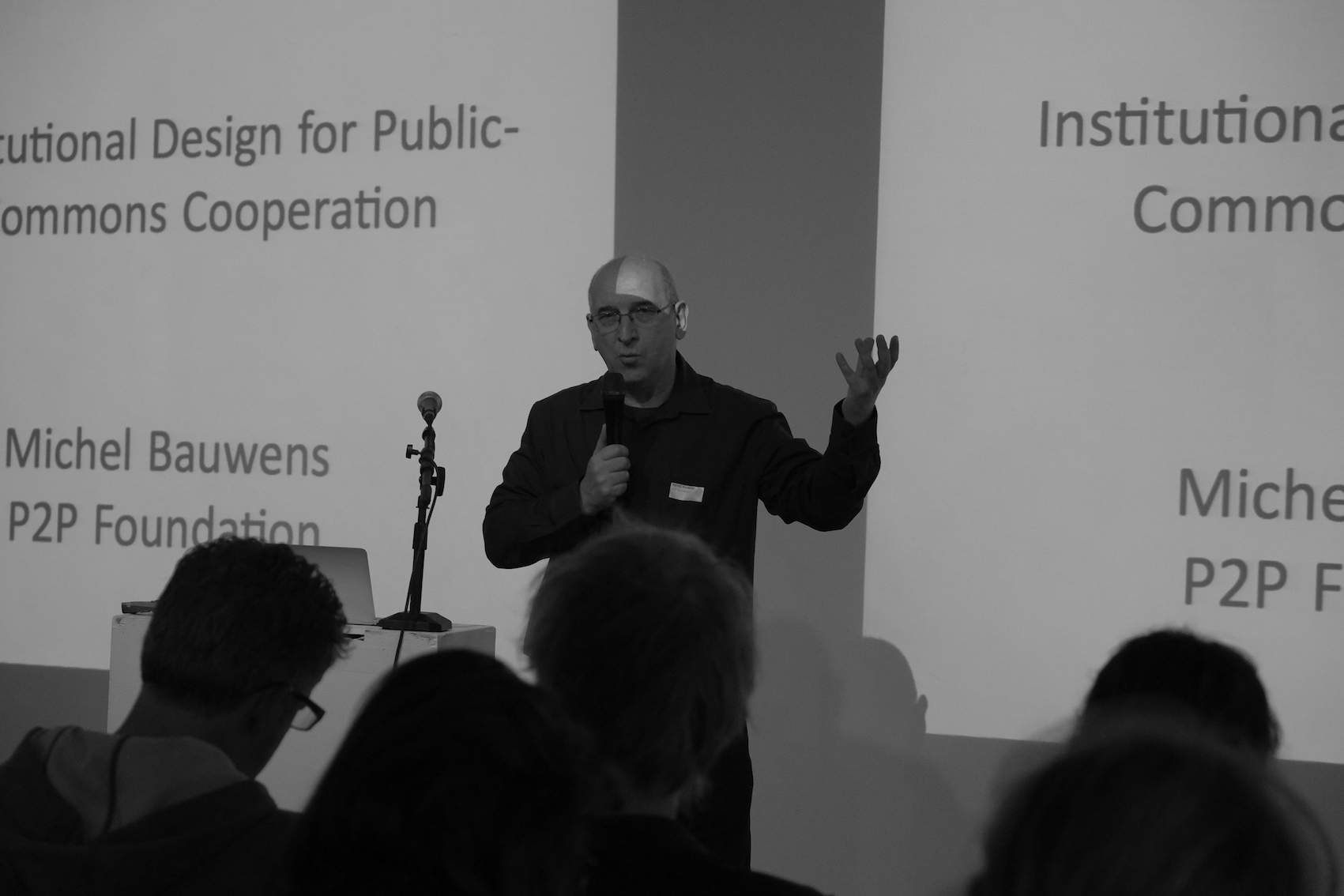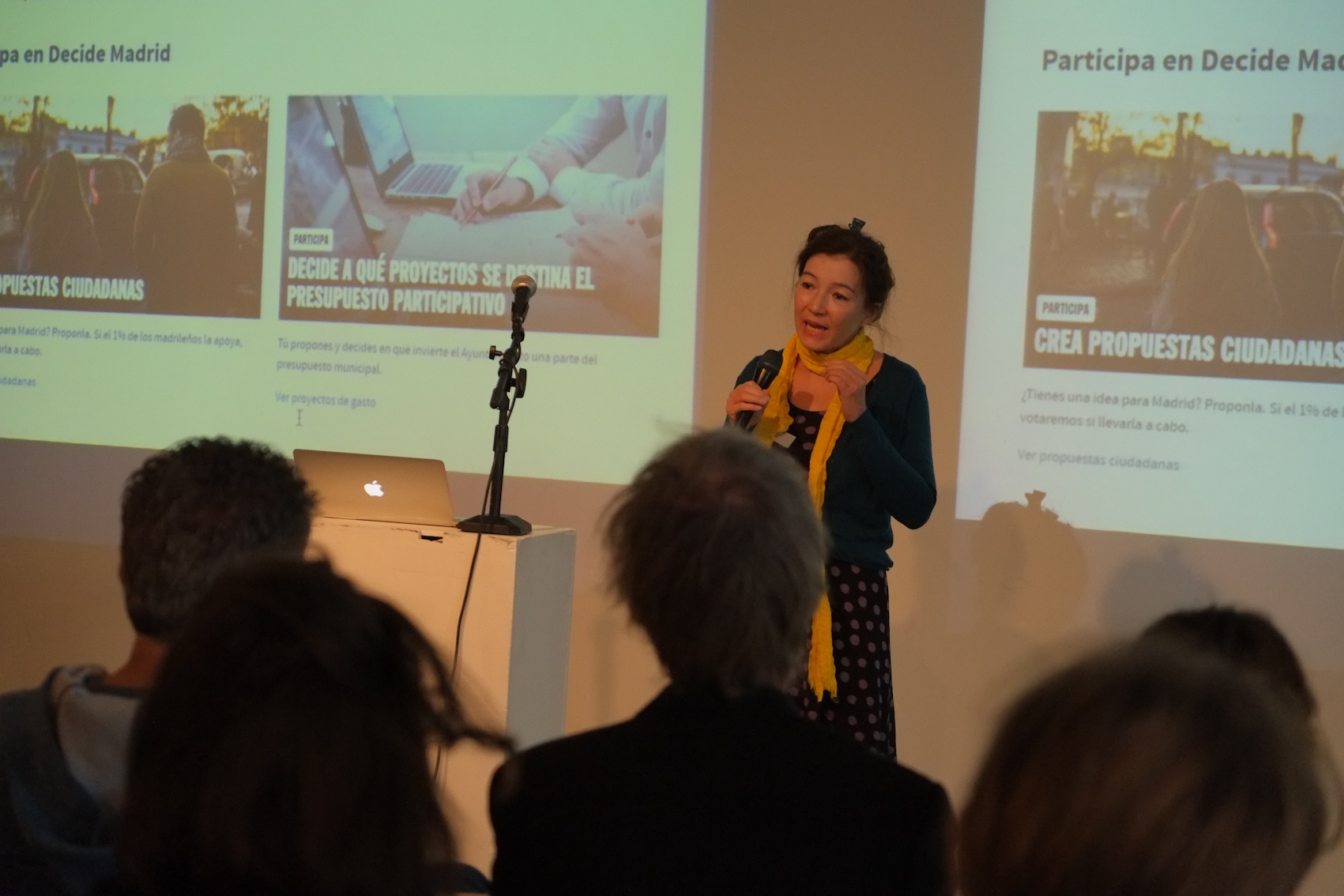In November I attended an excellent seminar in Brussels called #SWAP: So, what about politics? at iMAL, a ‘center for digital cultures and technology’ (which also hosts a FabLab). I must thank iMAL Director Yves Bernard, moderator Bram Crevits and the iMAL team for such an inspiring and educational event and for the careful selection of speakers and topics. I posted updates about the event as it proceeded on Facebook, and I will repost some of my notes, those short descriptions and links here, along with photos. iMAL livestreamed the talks and you can find all the videos here: https://www.youtube.com/playlist?list=PLjQCOGgYPYdhmhj6pzH6Dj7h49DIeaDcb

iMAL, Brussels. Photo: Cindy Kohtala.
Symposium Day 1: Friday 3 November 2017, 10:00 – 18:30.
Lectures and Debates.
Programme: http://www.imal.org/en/more/swap-day-1

Opening the symposium: iMAL director Yves Bernard. Photo: Cindy Kohtala.
Keynote 1:
Michel Bauwens, P2P Foundation
How can the commons change society, the economy and democracy?
Institutional Design for Public-Commons Cooperation

Keynote by Michel Bauwens, P2P Foundation. Photo: Cindy Kohtala.
-“The Place of the Commons in Human Evolution”: how we have moved from tribes that were commons-focused to states and markets.
-the natural commons includes e.g. agricultural commons or fishing;
-marked by a division between people who work and people who own;
-the commons have usually been social commons, cooperatives, mutuals, etc.;
-the third phase is the digital commons: with networks we start re-learning what the commons is, especially in the West.
-these are global communities, who recreate a new kind of commons.

Michel’s slide: The Place of the Commons in Human Evolution.
-recently I did a project in Ghent, to re-imagine the city of Ghent as a commons.
-what I learned there: first, there is an exponential rise in urban commons;
-second, the structure is much like the digital commons;
-at the core, there is the constitution of the commoning of the community, a structure which is open;
-thereby a new urban commons – with the same attitude as the digital commons, everybody can contribute and everyone who contributes has a voice;
-one thing they do well in Ghent is temporary usage of empty spaces: whether empty factories or land, lots of projects have emerged on this land;
-they don’t tell anyone what to do, they create conditions where everyone can use the land;
-in order to survive, people try to do generative economic activities;
-they don’t want to rely on subsidies, they try to think about self-sufficiency over time;
-in Ghent, there is a group that is experimenting with mushrooms, taking toxic sludge out of the ground;
-three things to note, a for-benefit structure, an open community and generative economic activities (not extractive);
-we did a mapping of 500 projects.
-how do these global productive communities function? in a capitalist society, while maintaining the commons?
-note the booklet Values in the Commons Economy
-in the market economy, the change in accounting is a marker – double-entry bookkeeping marked the birth of capitalism.
-what marks the birth of the cooperative? commoning?
-e.g. FB does not recognize externalities;
-it is a new form of capital that is commons oriented in an extractive way.
-but biocapacity: we don’t take into account positive environmental constraints.
-if you want to survive, we need to integrate these externalities.
-this needs a different value regime;
-creating a membrane around their activities and then try to do it differently;
–reciprocity-based licensing: knowledge should be free and shared, but commercialization can be conditional upon reciprocity.
-this is designed for commons-market cooperation.
-it is a move away from capital/state/nation, but not that everything we have now will disappear; these modes of exchanges have always existed in different combinations.
-how do we design a new combination? commons-partner-state regenerative.
-in Ghent, the city is incubating commons projects, the city and the region are supporting commons projects, supporting generative initiatives.
-but it is fragmented, e.g. you have permaculture east and permaculture west but they do not talk to each other locally;
-there is a renewable energy coop;
-they don’t have a joint language and identity.
-but note that every time a civilization has been in overshoot, there has been a return to commoning.
-from open source, free software, mutualization of knowledge;
-then the sharing economy, mutualization of infrastructure;
-then relocalization of production, cosmo-local production to a ‘biocapacity economy’.
-how do we de-fragment these processes, support them?
-a commons accord – an agreement between the city and the commons-oriented communities.
-a circle of finance – if you can determine a community can diminish ecological impact – things spent on negative externalities that the market economy does not recognize – use this to fund transition activities.
-how to manage the eco-social transition
-representative democracy, participative democracy, contributive democracy – we should know how these work together.
-participative logic is seen as top-down;
-contributive democracy can be elite – the city is forced to recognize those actions it claims it wants to do;
-the citizens are doing renewable energy and urban agriculture: if the city recognizes this is what it wants to do, it should recognize contributive logic.
-this is not working in Ghent yet.
-we want to create a narrative that permits alignment in the transition.
-about identity: I am a commoner, I contribute to the common good – this is not acknowledged or named.
-in working class history, farmers shift identity to being a worker.
-rather: we are contributing to the common good, I am a productive citizen, I build value.
-in the P2P Foundation, 12 people are working full-time.
-we have 5 (autonomous) streams and we use Loomio to come to legitimate decisions – projects have 1-3 coordinators who are responsible;
-we look after each other: when income comes in, we know who is in need, there is a difference between precarious workers and salary.
-all our knowledge is put in wikis and blogs.
-in society there is a shift to precarious, but there are also people who want to be autonomous, so it is not forced precarity.
-in the anarcho-capitalism model, using e.g. blockchain, they are not about the commons: they use it so that everyone can be a mini-capitalist;
-it is extractive – Bitcoin – to make money; it is not generative.
-blockchain is trustless machines, trustless algorithms – because no one trusts anyone;
-it is also very hungry for energy;
-we could use blockchain for e.g. shared supply chains.
-we already have mutual coordination in the software industry
-I want to have that in the production industry;
-create a biocapacity framework and within that framework, decide on what we can do.
http://commonstransition.org/commons-transition-plan-city-ghent/
*
Saya Sauliere, Medialab-Prado/ParticipaLab, Madrid, Spain
Understanding participation in Decide Madrid, an e-participation platform

Saya Sauliere on Decide Madrid. Photo: Cindy Kohtala.
-DecideMadrid software: open source, now in 16 countries, 60 cities, replicable, free, transparent;
-CONSUL platform.
-for example, City Hall asked the citizens of Madrid if they were willing to reform a key square, what kind of reform they wanted to have, then citizens chose among many projects, and then they decided between two projects.
-also Participatory Budgeting and Citizen Proposals
-participants are citizens as well as NGOs and neighbourhood associations
https://decide.madrid.es
*
Sanna Gothbi, DigidemLab, Göteborg, Sweden
Bringing together hackers and activists for social change

Sanna Gothbi on DigidemLab. Photo: Cindy Kohtala.
-a non-profit ‘lab’ – an open space for experiments;
-started this year, February, inspired by Medialab-Prado.
-Sweden does not have a large hacker or civic tech community, and there is a growing wave of racism and right-wing nationalism.
-three principles for the Lab: building participation from below; dialogue is not enough – we have to do more; tools for democratic participation need to be developed and controlled by the citizens.
-using the G1000 as a citizen summit as an alternative to the G20.
-working with MedialabPrado on the Democat platform.
-fostering a local civic tech community.
*
Emmanuele Braga, Macao, Italy
Macao and its Commoncoin: the question of value

Emmanuele Braga on Macao. Photo: Cindy Kohtala.
-Macao is an organization of 100 people from the cultural sector, also a space, a squat: people working for their own projects as well as the organization;
-self-managed;
-members use crypto currency between them.
-as an organization we provide monthly the power for commoncoin to buy in the system – e.g. a collective order from farmers as an association in euros, then in the organization the goods are bought with commoncoin.
-euros come from events, donations, co-production of work.
-the organization does not pay a wage, 20% of the general income goes to the members as basic income.
-started in Nov 2016.
http://www.macaomilano.org/IMG/pdf/commoncoin-2.pdf
*
Lieza Dessein, Smart, Brussels, Belgium
Technology geared towards solidarity

Lieza Dessein on Smart. Photo: Cindy Kohtala.
-an independent cooperative that works as an intermediary supporting creative industry and other autonomous entrepreneurs;
-founded in 1998 in Belgium as a social enterprise – with the aim to take over paperwork linked to creative entrepreneurship: we take on the role of the employer for the time of the freelancer’s mission.
-mutualized services: payroll, VAT declarations, salary guarantee, debt collection, microfinancing, personal and legal advice…
-also investing in workspaces;
-grew organically and rapidly scaled up.
-90 000 members in Belgium, changing to a coop structure in Belgium as the structure is a coop in other countries: a long, important transition;
-this is in constant progress, in constant dialogue on what tools to use, how to use them, on transparency, ethics.
*
End of Part 1.









